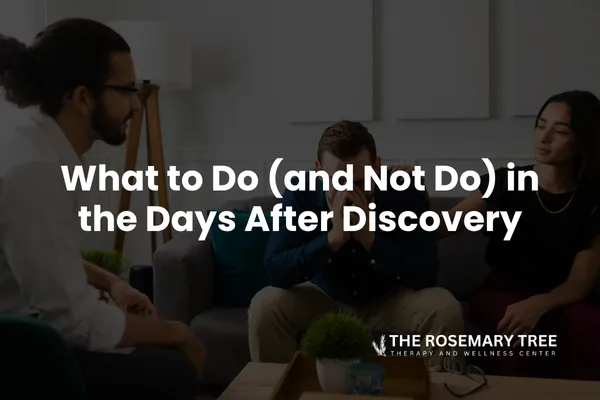
What to Do (and Not Do) in the Days After Discovery
When You’re Standing in the Aftermath
The first few days after betrayal comes to light can feel like walking through smoke. Everything feels unclear. Emotions shift from anger to confusion to disbelief within minutes. You may feel like you need to do something, anything to make sense of the chaos.
But the truth is, you do not need to fix everything right now. You only need to find stability.
The Importance of Slowing Down
In trauma, the nervous system is in survival mode. The brain floods with stress hormones, which makes it hard to think clearly or make sound decisions. Trying to repair the relationship, gather every detail, or decide whether to stay or leave during this stage often leads to deeper pain.
The most important thing you can do in the early days is pause. Slowing down is not avoidance, it is wisdom. It allows both your body and your mind to begin processing what happened safely.
What to Do in the First Few Days
Focus on Safety and Stability
Take care of your basic needs first. Eat something nourishing, hydrate, and try to sleep, even if rest comes in short intervals. Ground yourself with slow breathing, gentle movement, or spending time in a calm environment.Reach Out for Support
You do not have to face this alone. Reach out to one trusted friend, counselor, or therapist who can listen without judgment. Choose someone who will support your healing, not amplify the conflict.Set Immediate Boundaries
If you need space, take it. Let your partner know what kind of communication feels manageable right now. Boundaries are not punishment; they are protection for your nervous system.Journal or Speak Your Thoughts Aloud
Putting emotions into words helps organize the chaos in your mind. You do not need to make sense of them, just express them.Avoid Major Decisions
This is not the time to decide whether to stay or separate. Those choices are best made once your mind and body have calmed enough to think clearly.
What Not to Do in the Days After Discovery
Do Not Demand or Reveal Every Detail Immediately
Full truth-telling has a time and place, but when done impulsively, it can create more trauma. Wait until you can both speak with structure and guidance, ideally in a therapeutic setting.Do Not Use Social Media as an Outlet
It may feel tempting to vent or seek validation publicly, but this can lead to regret later and make repair more complicated.Do Not Engage in Retaliation
Trying to hurt the other person to match the pain you feel may offer short-term release but causes long-term damage.Do Not Pressure Yourself to Forgive or Forget
Forgiveness is a process, not a reaction. You do not have to rush emotional healing to appear strong.Do Not Assume You Are Alone
Betrayal is more common than most people realize, and there are safe, professional spaces built to help you navigate this.
Why You Need Guided Support
Trying to manage this level of trauma without structure can lead to emotional exhaustion. A trauma-informed therapist can help you:
Understand what is happening in your nervous system
Create stabilization and safety plans
Build communication tools that prevent re-traumatization
Begin mapping out what recovery could look like
Our Accelerated Deep-Work Therapy Intensives were created for exactly these moments, when weekly sessions feel too small and emotions are too raw to contain in one hour.
In this extended format, couples have time to breathe, process, and begin healing safely.
When You Don’t Know What to Feel
It is common to feel love, anger, sadness, and disbelief all at once. Emotional confusion is a natural part of trauma. There is no “right way” to feel. The goal is not to erase the pain, but to make it bearable enough to start moving forward with clarity.
Your feelings are valid. They are evidence that you care, and that healing is still possible.
Final Thoughts
The days after discovery are often the hardest, but they are also the beginning of something new. You do not need to have all the answers right now; you only need to take the next gentle step toward stability and care.
If you need support, we would be honored to walk beside you. You can reach out to us here, and our team will connect with you to talk about what this process could look like. There is no pressure, only space for healing to begin.


